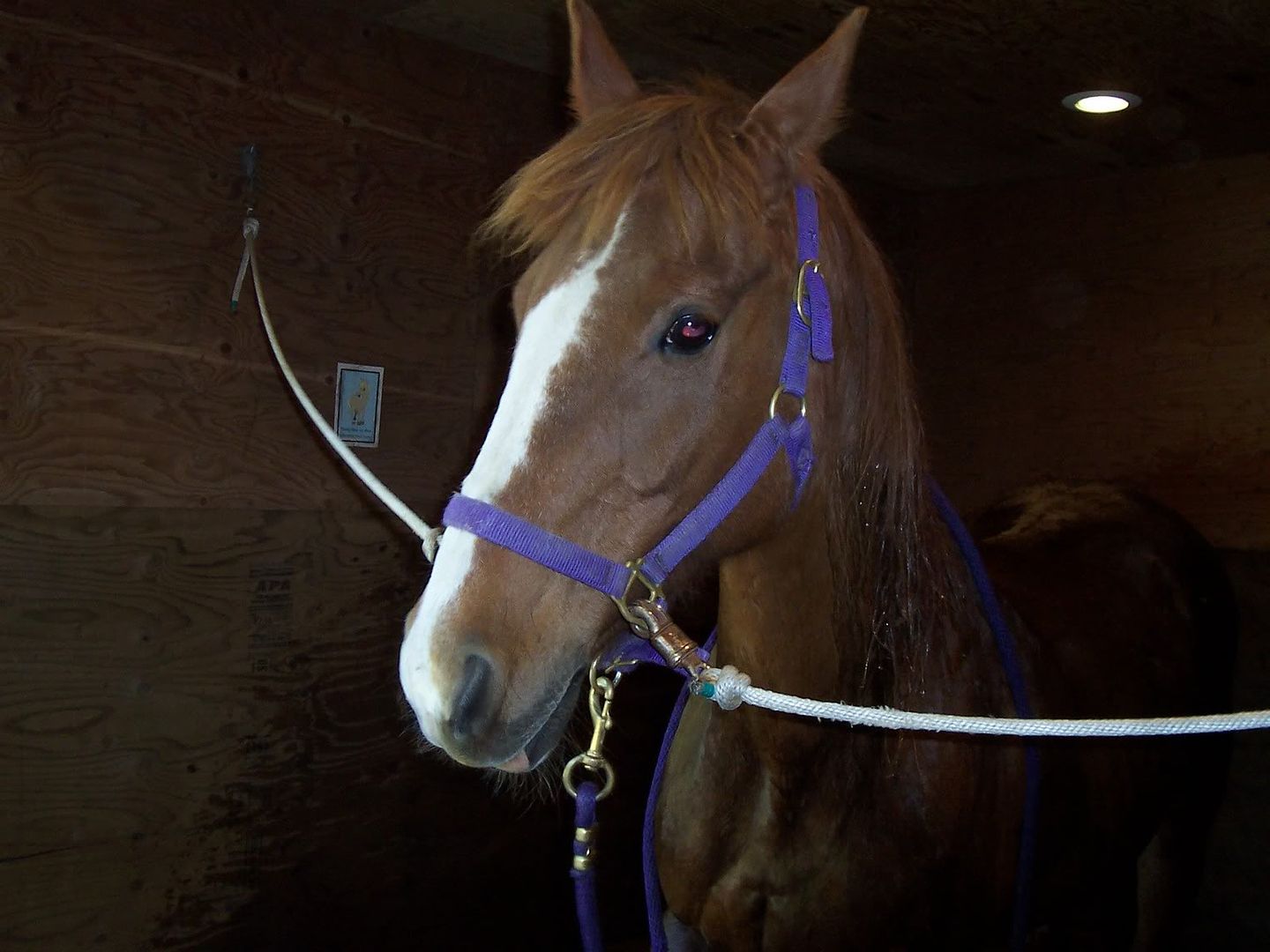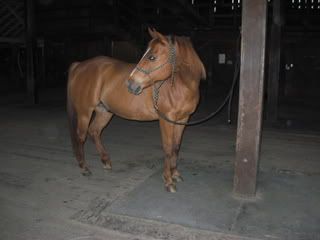If Sam is the only one close to the feedlot, assessing, qt'ing, etc. then nothing can change.
The only way it would work is if the BOD fires Sam and hires another person (that is willing to take direction from the BOD ) to do do her job.
When we incorporated our company, we talked about forming a non-profit. (You can see how easy it is to not show a profit.) We chose not to because we would lose the control we had operating as a private company. Joe Shelton is in the same business as Sam, but he stays private as well. And it doesn't limit either the donations he receives or the number of horses he saves. It's his decision which horses to rescue and where they go and no one really has a problem with that. Sam could do the same thing.
I think if there are violations of the CBER's bylaws regarding the actions of the BOD and officers, someone should file a complaint with the WA Attorney General. I assume it should be someone in Washington with either direct knowledge of wrongdoing or has personally been injured.
From the the "Information for Donors" on the WA Secretary of State website:
How to File a Complaint
If you feel a charity or commercial fundraiser is operating in a deceptive or illegal manner, contact the Consumer and Business Fair Practice Division of the State Attorney General's Office at 1-800-551-4636 (TDD: 1-800-276-9883). You may visit the Attorney General's website and file a formal complaint online at:
fortress.wa.gov/atg/formhandler/ago/ComplaintForm.aspxThis is fun - here's from the IRS's Non-profit "Ongoing Compliance" page:
www.irs.gov/charities/charitable/article/0,,id=123304,00.html
Inurement/Private Benefit - Charitable Organizations
A section 501(c)(3) organization must not be organized or operated for the benefit of private interests, such as the creator or the creator's family, shareholders of the organization, other designated individuals, or persons controlled directly or indirectly by such private interests. No part of the net earnings of a section 501(c)(3) organization may inure to the benefit of any private shareholder or individual. A private shareholder or individual is a person having a personal and private interest in the activities of the organization.
How Do You Report Suspected Tax Fraud Activity?
www.irs.gov/individuals/article/0,,id=106778,00.html
The following is what I sent to Sam, copying all the "faux BoD". We pointed out the Inurement, as well as some of the problems we knew about at the time. The "hypotheticals" were not actually hypothetical, btw. Sam's response to questions was "Shame on you for asking these things". Right. Shame on me for thinking things could ever change.
From: mmpagani@bellsouth.net
To: bod@columbiabasinequinerescue.org
Subject: Fw: December- Income and Expense Statement
Date: Mon, 11 Feb 2008 19:03:01 -0600
If this is not fresh in anyone's memories, the emails are still copied below. At issue are CBER's finances, accountability, and 501c3 status. Right now, there does not seem to be a distinct line between CBER's finances, Camelot's finances, and Sam's personal finances. We are
at extreme risk of not passing the IRS audit for final determination of our 501c3 status. Not only would our status probably be revoked if this were done right now, but it could be revoked retroactively. This would mean anyone who donated could request a refund of that donation, and the BOD would be liable.
According to Marlene's expense statement, less the invoice for quarantine paid to the Lazy Spur, Camelot took in $9,065 in quarantine fees and in board of healthy horses for the month of December. That matches Sam's original email before the back-tracking, detailing her expenses and complaining of making only $800 profit after all her expenses, both personal and business. This illustrates the tangled mess that has become CBER, Camelot, and Sam's finances. The long list of horses sent by Sam that had allegedly not received quarantine, the majority of those had been paid and the receipts found, including Jade, Alpine, Cinnamon Swirl, and others. It is also surprising and upsetting that Yukon is on this list. Not only was Yukon's quarantine paid, but he spent most of his quarantine at Shawna's, not Sam's. It would seem that CBER is being charged and penalized for a lack of accurate recordkeeping for Camelot, just from a surface examination.
Another priority issue right now is IRS Treasury Regulation 1.501(c)(3)-1(c)(2)) addressing Inurement/Private Benefit - Charitable Organizations. It states the following:
"If private benefit is found to exist in a tax-exempt organization, it can be the basis for revocation of the tax-exempt status of that organization. Any private benefit from an activity must be "incidental" in both a "qualitative" and a "quantitative" sense to the overall public benefit of the activity."
A section 501(c)(3) organization must not be organized or operated for the benefit of private interests, such as the creator or the creator's family, shareholders of the organization, other designated individuals, or persons controlled directly or indirectly by such private interests. No part of the net earnings of a section 501(c)(3) organization may inure to the benefit of any private shareholder or individual. A private shareholder or individual is a person having a personal and private interest in the activities of the organization.
Right now, mandatory quarantine with Camelot as the ONLY option, at the rate of $300/mo., is Inurement. We could lose 501c3 status right now based on this law alone. This is not just my opinion, but the opinion of several experienced accountants.
I do strongly believe that if CBER is to survive, they must be addressed appropriately and immediately, and that those in position to do so, facilitate financial transparency to protect CBER and the BOD from the IRS. The following are suggestions only, and I really do hope and pray that the rest of the BOD take this seriously and add their own input, concerns, and potential solutions. This is not in any way a personal attack, and no, I am not "shamed" to be saying any of this. Dozens of volunteers put in long hours for ZERO pay, and have for several years. They deserve better as well. There are a lot of lives depending on the success and longevity of CBER.
1. Regarding mandatory quarantine in a CBER facility: For IN-STATE adopters, they may quarantine their adopted horse providing the following conditions have been met: a. Their facility has undergone a site check and has been determined to be adequate for quarantine. b. The horse they are adopting does not show signs of active strangles. c. They sign a waiver and release of liability. d. Absolutely no 3rd party quarantine.
2. Income and expense detailed on a line item report. No vague entries, e.g. $6,000 misc. expense. This to be compiled by and for the bod and accessible to the bod. Possibly public, over time after we have our act together
3. BOD to receive copies of monthly Bank Statements, and VP/Treasurer to be listed as a signer on the Checking Account.
4. Expenses that cross over between CBER and Camelot okayed by the bod in advance.
A clear explanation of what belongs to CBER, what belongs to Camelot, and what belongs to Sam personally is necessary. An example of this problem is if Sam's trailer, her personal property, needs repairs...who pays for it? CBER should not, as it is Sam's personal property, and Sam already receives $30/head transport fee. Trailer repairs would be Sam's personal cost of doing business. Also, initially CBER paid for the shelters, but now I hear that on paper things got swapped around so that they belong to Sam...?
5. Rates paid by CBER to anyone housing a CBER sponsored horse should be okayed by the BOD. It would be interesting to have a factual accounting of exactly how much from the Line of Credit went to pay for healthy CBER horses waiting for adoption at the rate of $300/per month per head. If the IRS was already upset with CBER over all the other issues, this could very easily be determined to be money laundering.
6. Accountability for corporate and individual donations of items. Some of the tack could be auctioned or sold on the website to raise funds for CBER or gifted to adopters or donators as a thank you.
7. MOST importantly, an agreement that any volunteer will NOT send a horse back to the feedlot, no matter the circumstances. If someone knows of a volunteer intending to do this, and does nothing to stop it, they are equally complicit and a resignation should be given immediately.
8. Accountability of use of CBER owned assets, including vehicles. CBER is making the payments on the CBER truck and its associated expenses. It is wrong financially and ethically to use this truck for hauling to financially benefit a 3rd party. For example: Jeff, Sam, or John use CBER's truck to deliver 4 CBER adopted horses to Seattle from Yakima, charging each $150-$200 each, maybe bringing one back on their return. If this $600-$800 were kept by the person that drove the CBER truck, that would be unethical. He/She could of course be paid for their time and have this accounted for in CBER's books, and the remainder go to CBER. Anything other than that scenario is financially unethical.
Regarding No. 3: If full financial disclosure and financially ethical behavior is not the mode for CBER in the future, I sincerely hope that Wendy/VP is NOT listed on the checking account, as then there is the distinct possibility that only the signer for the account would be accountable for any liability or restitution determined by the IRS.





